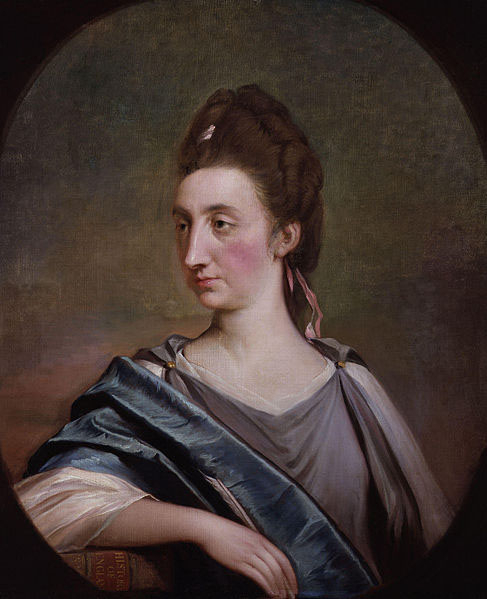“Cave” and “Aladdin’s”, not words you associate with a place to park your car. But let he (or she) who has not turned their garage into a room for the temporarily unloved and yet too precious to be parted with, cast the first knick knack into the box labelled charity shop.
I am not saying that emptying your garage will provide you with an epiphany, but mine did. In effect I got more than one revelation. The first was the rule that, in life, as in art, “condition is everything”. The second is that how lowly, at least in money terms, is held the craftsmanship of hundreds of years past. And the third — and indeed for me the most important is my sudden acquaintanceship with my new friend, Catherine Macaulay.
For the wiseacres who knew of her all along, keep going, nothing to see here. Move along a couple of paragraphs. But for me, and of course you, even though we’re ‘smarter than the average bear’ when it comes to minor historical figures, this is new news.
We knew of women occasionally surfacing from a sea of man centeredness — women who pioneered by doing, Angelika Kauffmann RA, the Mary Wollstonecraft’s, mother and daughter, Mary Seacole, Florence Nightingale, Sacajaweya, Elizabeth Fry, Susan B Anthony and many, many more. But I knew nothing of the world’s first woman who was a professional historian.
Amid the cds and bank statements from 20 years past I found a large leather bound book. It was nobly titled The History of England and it was published 255 years ago in 1763. Who was the author? the ‘celebrated historian’ (to use the phrase that often preceded her name in contemporary news stories), Catherine Macaulay. What the… who the…?
This wasn’t some dilettante who wrote fanciful history for children – and there were a fair few of those who took to writing as an alternative to sewing samplers. Macaulay was that good an historian that admirers even published poems about her historical method. I quote a couple of lines from The Scots Magazine in December 1763 after volume one of the history had been received. It ends:-
She from the pedant’s hearse and tyrant’s grave
Strips the false plumes that slave-historians gave
And, soaring free, where man has checked his flight
Shows women fitter both to rule and write
A bit of abbreviated biography might be helpful. Catherine lived from 1731 to 1791. Her family was rich enough to see that she was privately educated by a governess. Her parents’ own enlightenment meant she learned the subjects more often reserved for a boy child. Greek and Roman history gave her ‘an enthusiasm for libertarian and republican ideals’.
She married Scottish physician George Macaulay in 1760. After her marriage she began her History of England from the Accession of James I to That of the Brunswick Line. It was published in eight volumes between 1763 and 1783. The History was widely read in spite of controversy over its republican sympathies. It championed the Parliamentary cause but condemned Oliver Cromwell as a tyrant.
Husband number one died in 1766. She moved in 1774 to Bath, where she ‘attracted many admirers’. Macaulay took up the cause of the American colonists by attacking the Quebec Act and British colonial taxation in her Address to the People of England, Scotland and Ireland (1775). In 1778 aged 47 she again married to William Graham, a 21-year-old.

Thereafter she styled herself Catherine Macaulay Graham.
On a trip to America in 1784–85, she and her husband were guests of George Washington at Mount Vernon. Her last political tract, Observations on the Reflections of The Right Hon. Edmund Burke on the Revolution in France (1790), defended the French Revolution. President Washington wrote her a long and consequential letter in that year. Reflecting on leaving the British Empire he castigates the “remainers” after what be be called his country’s Amerexit. Washington tells her: ” I think you will be persuaded that the ill-boding politicians — who prognosticated that America would never enjoy any fruits from her independence, and that she would be obliged to have recourse to a foreign power for protection — have at least been mistaken.”
Now why I am writing about Mrs Macaulay and what does that have to do with the epiphanies? Among the mouldering bank statements was a first edition of volume one of her History. It is a first edition. It is 255 years old. It is perfect in all respects bar one, as its board front cover is no longer secure. As I said before, condition is everything, it seems. Antiquarian booksellers I contacted, who I imagined would jump at the opportunity to take up and repair this piece of feminist history to preserve and sell on for future generations, they all declined.
But at least I got to meet Mrs Macaulay.
